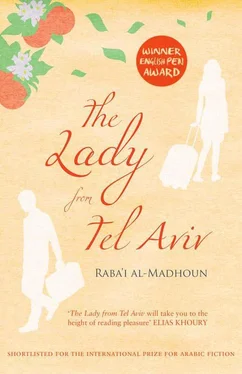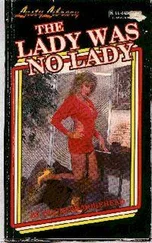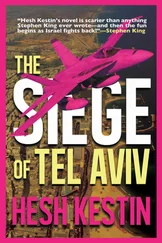Immediately after noon prayers, men — young and old — from all sides of the family begin to pour in. Platters of meat and rice are laid out and another scene begins to unfold, borne in on a warm sense of family. More than one hundred men of all ages are gathered together, devouring the food before them and exchanging greetings and questions with me. Some I am meeting for the first time. Others are old friendships rekindled as we sit in the tent they have erected for the occasion on the rooftop.
Suddenly, I cannot get the thought of Muhammad Samoura out of my head. Will he be happy to see me? Will Muhammad recognize himself in the image of the tailor he is in my memory? Muhammad has been a police officer for a very long time now. In his life as a tailor, he never managed to put enough order into a pair of trousers to make their seat fit their wearer’s arse. And now, as a police colonel, he is in charge of law and order. Most cops are Fatah supporters. Even if he was not one before, he had to become one. Will you dare ask him about all the corruption, knowing that he is one of those whose job it is to protect the corrupt? He will just shake his head and tell you it is a matter of state security. If you ask him about all the thieves, he will probably tell you that the PA is on the job — even though you both know that it was the PA who brought the real thieves with them when they arrived.
Still, I love Muhammad and badly want to see him. He will not believe it when he sees me — he will probably joke: ‘Walid! I’m going to have to detain you all summer so we can really visit with you!’
I take Abu Hatem aside. When Majdi sees us, he hurries over to join us.
‘Where’s Col. Muhammad, Abu Hatem?’
He does not answer. Then he asks, ‘You mean Muhammad Samoura?’
‘I want to see at least one of my old friends while I’m here!’
Abu Hatem does not say anything. The same look of consternation that I saw yesterday when I asked about Said now appears on his face. When he begins to shake his head, the same fear begins to jab at my heart.
‘What is it? Why aren’t you speaking, Abu Hatem? I want to see Muhammad. You invited him, didn’t you?’
‘How could I, cousin? Look, no offence, but you don’t live here and you don’t understand what’s going on. There’s bad blood between us and the Samouras. One of them killed one of us.’
Majdi jumps in to explain. ‘Your friend has a cousin who’s in the National Security Forces. He got into some ugly words with another officer he worked with, Fuad Dahman. Even though they were good friends and worked together, they quarrelled and fought until it got really bad. One day the Samoura kid pulled out his pistol and shot Fuad. No one in the family was willing to take the blood money or make up with them. No one wants to let go of what happened — and no one has forgotten it. You know how it is — blood is thicker than water, cousin.’
Our family now kills and is killed. What kind of family is this that I’ve come back to?
‘Abu Fadi, would you have wanted me to invite your friend and throw him to the Dahmans? He wouldn’t have come had I invited him.’
At this moment, I finally grasp that I live in a world separate from theirs, and that Gaza has gone backwards fifty years in time. It is senseless to continue opening up old files.
Abu Hatem agrees to let the matter drop while I try to digest this news, the second shock I have felt since my arrival.
On another night in Khan Yunis, another guest descends upon us. Who it was that beckoned him, I do not know. It may well have been Abu Faruq, who was introduced to me on the night of the feast. The man who would not stop telling everybody that he was Abu Hatem’s pharmacist friend. It was probably him, but it could have been any one of the thirty or so relatives who had come to spend the evening with us. In any case, I did hear someone beckon the illustrious guest, even if he did not actually mention the man by name. All he had to do was say ‘the pride of the Arabs’ and everyone knew who he was talking about.
Saddam Hussein? Now it’s getting good , I tell myself as I switch on the tiny digital recorder I have been carrying in my shirt pocket. The only part of the device that shows is a gold clip that looks like it’s part of an expensive pen. The words are still in my mouth when a voice booms out from the middle of the room. ‘Nothing has fucked us up like that buddy of yours, Abu Faruq.’
So it was the pharmacist who said it? I turn to see how Abu Faruq is going to respond to the challenge.
‘He is, despite what you and others might say, the best of the best. A real Arab.’ Abu Faruq’s voice rises above the bubbling of the shisha and the murmuring of the men. And then he throws the ball in my lap. ‘What do you think, Abu Fadi? You’re a journalist. You know better than us.’
I exhale, the thick smoke rises into the air. I take cover in a non-committal answer. ‘I didn’t come to talk, Abu Faruq. I came to listen.’ I let my recorder run, taping the evening’s conversation.
‘Abu Faruq, what’s so brave about hiding an old missile or two, and then firing them on Israel and sending everyone in the region to hell, Iraq included?’
‘Shakir, who was the one who helped you at the start of the Intifada?’
‘You mean: who was paying people to carry his photo around on placards? Who was ruining our reputation throughout the whole world? Fifty dollars for anyone hit by a rubber bullet. One hundred dollars for a real bullet. Two to four thousand for your family if you die. It doesn’t matter if you’re injured or killed — all that matters is that someone gets hit. The money’s there, waiting to be spent. Then, one day the money’s all gone and all we’re left with are our dead and crippled. Gaza’s full of them. How did this help our cause?’
‘OK, let’s not get too hung up about Saddam and his bombs. Listen, I want to tell you about what happened to me one night when I was coming back from Tel Aviv.’
‘Don’t try to change the subject, Abu Hatem.’
‘Majdi, habibi , listen. We talk about the Saddam phenomenon all the time, let me tell my story and you’ll see. Abu Fadi, this really happened to me during the First Intifada. I got to Beit Hanoun crossing at about 1 in the morning. Luckily for me, the soldier on duty was this gorgeous Indian girl. She looked just like the actress in that film Singam , way back when there used to be cinemas in Gaza. God have mercy on us these days! Remember when Gazans could play hooky by going to the movies? Where was I? The Jewish girl. The Indian girl. Right when she puts the magnetic strip of my ID card into the computer, the screen goes dead. I say to myself: That’s it, the central computer’s down, I’m going to have to spend the night here . The girl asks me: “Do you have a permit?” I say: “I swear. It’s in my ID.” But she doesn’t understand what I’m saying, so I tell her to call the officer in charge. He comes over, stretching and yawning. “Where you coming from, khabibi ?” he says. I tell him I’m coming from a friend’s wedding in Tel Aviv. He starts typing and says: “Wait here.” Then he sees something that tells him I’m good to go. I let him mess around with his computer and decide to call Mr Sha’ul, the guy whose house I was at. At first he is bent out of shape because I’m calling him so late. Then he asks: “ Efo ata , Abu Khatem? What’s going on? Where are you?” I tell him I’m at the crossing and that they’re not letting me through. He says: “Put the officer on the phone.” I give the phone to the officer and they start talking. Next thing you know, these guys are laughing their heads off and chatting away. After about five minutes, he tells the Indian girl: “Let him through.” The point is, everyone, Mr. Sha’ul and I were like friends. Even closer. We worked together for fifteen years or so. We worked together throughout the First Intifada. Throughout the founding of the PA. And then things got bad. One time we were even thrown into jail together. OK, we weren’t incarcerated, but we were detained. The army tried to hold us for taxes we paid or didn’t pay. The point is: we suffered and succeeded together. He used to come visit me in Rafah when the garment factory was there. He came to see me in Khan Yunis when it was too dangerous for me to go to him. What I mean is this: we had a real relationship. A friendship through thick and thin. He must be seventy by now. Could I have another coal for my arghileh, Abul-Nun?’
Читать дальше












